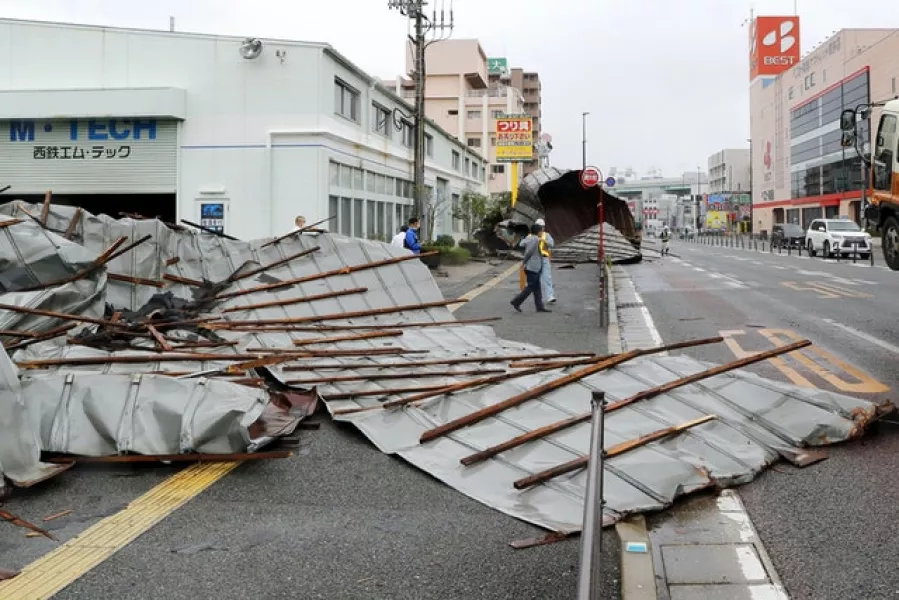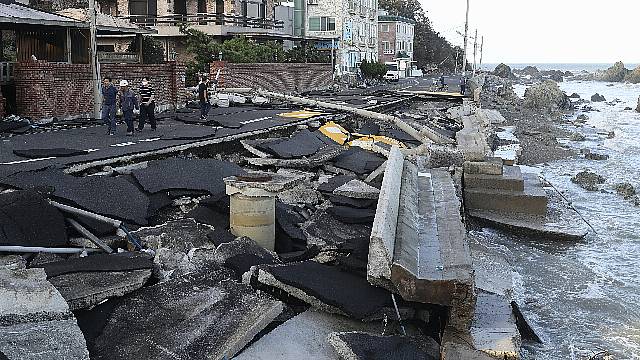The Korea Meteorological Administration said Typhoon Haishen was passing over waters off the eastern coastal city of Sokcho on Monday afternoon after barrelling through South Korea’s southern and eastern regions.
The typhoon was weakening, with its maximum winds measured at 67mph after blowing at 80mph in the morning, and was forecast to be downgraded to a tropical storm within six hours.
Japanese disaster management officials in Kagoshima said a woman in her 70s died of a head injury after falling into a roadside ditch while evacuating from a coastal town as Haishen lashed southwestern Japan over the weekend with strong winds and rain.

Japan’s Fire and Disaster Management Agency said at least 38 other people were injured, five of them seriously.
Schools and department stores were closed in Hiroshima and other cities in the country’s south west.
Damage caused by the typhoon was less than feared because it took a path farther from the coast and weakened more quickly than expected, officials said.
In South Korea, more than 100 homes were destroyed or flooded, while cars struggled to navigate flooded roads in Ulsan and other coastal cities such as Busan, Sokcho and Gangneung.
Emergency workers scrambled to clean up toppled trees and damaged traffic signs, buildings, port facilities and other structures.
At least one person was missing after getting swept away by water that filled a drainage channel at a limestone mine in the eastern coastal town of Samcheok.
Another person was found dead in Busan, but officials said it was not immediately clear whether the death was caused by the typhoon.

At least five people were hurt, including one in Busan who sustained light injuries after a car flipped over in strong winds, the Ministry of the Interior and Safety said.
The storm also destroyed or sank around 80 fishing boats, and caused generating turbines at two nuclear reactors in the southeastern city of Gyeongju to automatically stop.
No leakage of radioactive materials was detected.
Hundreds of flights in and out of the southern island province of Jeju and across the mainland were cancelled.
Some bridges and railroad sections were shut down, thousands of fishing boats and other vessels were moved to safety, and more than 2,600 residents in the southern mainland regions were evacuated due to the possibility of landslides and other concerns.
Workers as of Monday afternoon had restored power to 49,643 of the 75,237 households that lost electricity in the southern mainland areas and Jeju.
Haishen, which means “sea god” in Chinese, ploughed through Okinawa and other southern Japanese islands over the weekend.

Traffic was still paralysed in places, bullet train service was suspended and most domestic flights in and out of airports in southwestern Japan were cancelled on Monday.
Regional officials in Miyazaki said rescue workers were looking for four people missing after a mudslide hit the mountainous village of Shiiba.
A fifth person who was rescued at the site was seriously injured.
Electricity was restored to thousands of homes in Japan, but more than 340,000 others were still without power.
Nearly four million people in Japan were still advised to evacuate as of Monday afternoon.
The storm by late on Monday was expected to reach North Korea’s northeastern region, which was battered by Typhoon Maysak last week, inflicting further pain on an economy ravaged by US-led sanctions, border closures from the coronavirus pandemic and chronic food shortages.
North Korean TV aired video of widespread flooding in the eastern coastal city of Wonsan and nearby Tongchon, but the country’s state media did not immediately report any casualties caused by Haishen.

The North’s state media earlier said leader Kim Jong Un visited typhoon-stricken areas, fired a top regional official for poor readiness, and promised to send 12,000 workers from Pyongyang to help with recovery efforts.
The North said Maysak destroyed more than 1,000 houses and inundated public buildings and farmland.
Maysak damaged roads and buildings and left at least one person dead in South Korea.
In addition, a livestock cargo ship sank off Japan’s coast as Maysak passed.
Two of its 43 crew members were rescued and one body was recovered before the search was halted because of Haishen.
The ship was transporting 5,800 cows from New Zealand to China.







